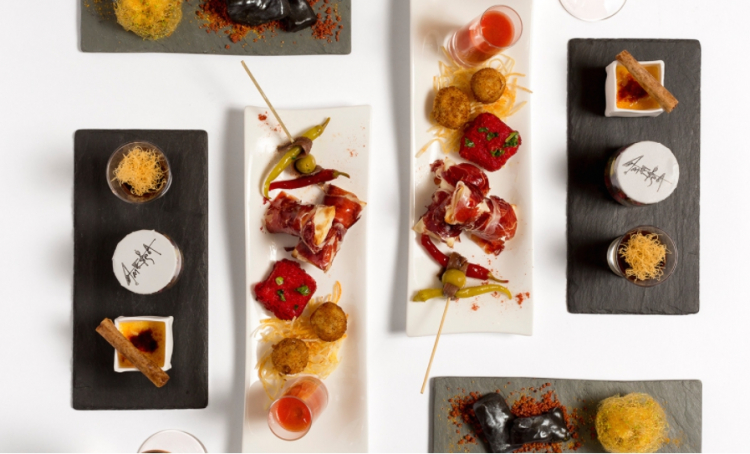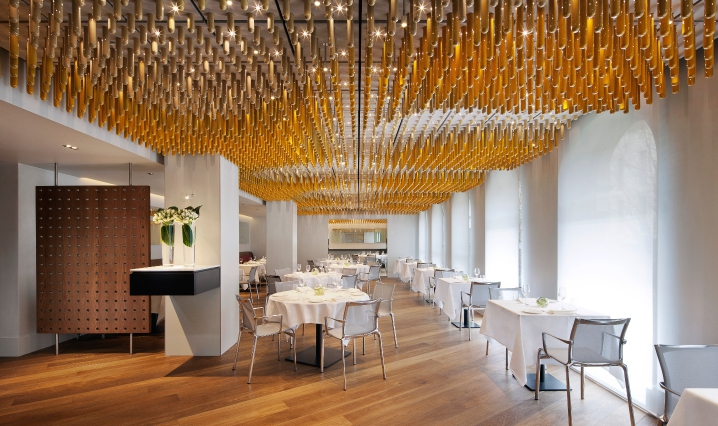I get to the elegant Halkin Hotel a little dishevelled, swearing against London traffic, forgetting my lipstick and, as I realise once back home, with my blouse inside out. I am here to meet Elena Arzak, World’s Best Female Chef 2012, at the helm – with her dad Juan Mari – of the 3 Michelin stars, historic restaurant Arzak in San Sebastian, and owner here of the Ametsa with Arzak Instructions within the hotel’s premises. Introducing myself, I tell her that meting her is a privilege, a precious opportunity and also a treat, since – having had a baby 3 months ago – I don’t go out much these days. Elena, who has two children, reassures me: “Don’t worry, there is light at the end of the tunnel and it gets easier” when I apologise for my tired looks.
Easy going, chatty, talking to her one might forget for a second that she is one of the most famous and respected chefs in the world, firm representative of the avant-garde of the innovation of global and Basque gastronomy. Yet when she mentions that a few weeks ago in Melbourne for the World’s 50 Best she was joking with Massimo Bottura at the table next to hers and had Niko Romito on the same flight, things get back into context. I ask her first of all how she’d describe her food to someone like me who has never had the pleasure to try it. “It has a personal style – she answers – with strong Basque roots but with up to date, contemporary techniques that did not exist before”. And with less fat and more vegetables than in the past, a more healthy approach overall. The differences are also in the very same restaurant, which was opened by the family in 1897, and is today a centre for culinary evolution and research.

In the Arzaks' restaurants, Basque roots are made contemporary
What would her grandmother say if she saw how far her and her dad have taken
Arzak? “She would be happy for two reasons –
Elena smiles – she wouldn’t recognise the food but she would be pleased with the taste. Also, she would be glad that the restaurant is still in profit and not losing money!”. Quite the opposite, in fact: the
Arzak Instructions (the company set up by father, daughter and 3 chefs collaborators) opened
Ametsa here in London a few years ago, obtaining the first Michelin star almost immediately.
Where would she like to open the next enterprise, if she could choose? No particular idea, Elena prefers surprises, and the London opportunity was one; she had never cut ties with the English capital after working here earlier in her career (at Le Gavroche). “Opening here was a way of learning a lot, and adapt our food to the city’s multiculturalism of tastes”. She then observes that the attitude here has changed since the 80s, and gastronomy has socialised; people now make an effort to spend money, almost like a investment. That is also why she cherishes the contact with her customers and makes an effort to talk to people as much as she can, to hear feedback and personal stories of those who often travel miles to taste her food.

The dining room at Ametsa, inside the Halkin by Como in Halkin Street, Belgravia
Family in general is a fil rouge in our conversation. We laugh on how her kids are interested in her cuisine but sometimes prefer the spaghetti prepared in their school canteen. She tells me she will let them choose on their own whether to follow her footsteps and it is too early to say, but that they will grow up knowing how to cook a healthy, fair diet for themselves but also to cook for others as sharing a meal is incredibly important.
I am surprised to hear that 80% of the staff at
Arzak is female (
Juan Mari grew up surrounded by women), and thus is easy to understand each other on the challenges of balancing such a demanding job with the role of wife and mother. In fact, the kitchens and the dining room are always open for the team’s children, and the images of the carnival or the Santo Tomas’ feast, with the parade and the colours of the banners carried by the city’s kids light up Elena’s smile. She waves goodbye inviting me to visit her in San Sebastian, as long as I bring my little one. She will then introduce him to the
Arzak art.